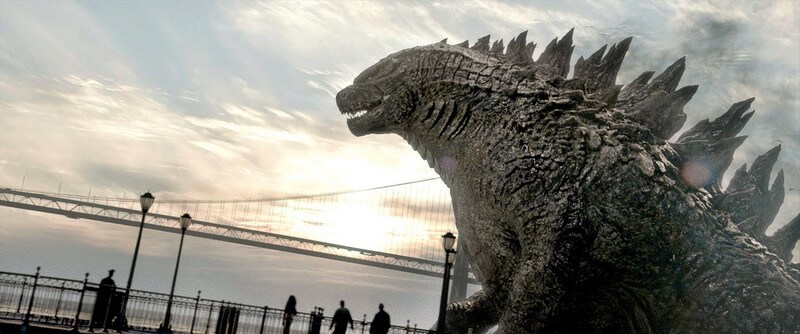At some point in time the Nazis, perpetrators of some of the most inhumane atrocities of the Twentieth century, became fair game for comic representation. The monstrous Germans became cartoon villains in light entertainment such as Doctor Who and stock pantomime baddies for an array of films - the systematic destruction of six million people became trivialised with a multitude of movie and television shows looking for cheap source material to exploit. A similar sense of crassness underpins the latest reboot of Godzilla.
Many moons ago, the original 1950s Japanese Godzilla was sculpted as a metaphorical reaction to nuclear tragedies inflicted upon the nation - art was created to make sense of the inexplicable as atomic bombs dropped on Hiroshima and Nagasaki melted hundreds of thousands of people into the ground. As black rain poured on flattened cities, the mushroom cloud left an indelible stain on the soul of the nation; Ishiro Honda's monster movie represented a tactful and subtle, philosophical enquiry to a great human tragedy.
The latest re-boot of Godzilla, however, was not made as an attempt to address Fukushima, the latest nuclear catastrophe in Japan. Rather, much like those who have invoked the horrors of the Third Reich for cheap thrills, Gareth Edwards' latest take on the giant monster uses an unspeakable disaster as an excuse to create light entertainment. As we see schools evacuated and buildings crumbling in the wake of a nuclear melt-down, mirroring the misfortune of Fukushima, there's a real unease that these heartbreaking scenes have been stolen from reality so as to create a set-up for a film boasting a primary function of showcasing cartoon monsters breathing fire at other CGI dinosaurs. A smear of exploitation runs through the movie.
Despite being filmed, for large stretches, with "verite" shaky cams, the main influences on the Gareth Edwards' Godzilla appears not to be Honda's original, nor the real life events of Fukushima for the most part, but rather the overblown disaster flicks of Michael Bay and, more disconcertingly, Who Framed Roger Rabbit? There's not much in the movie in which cartoon explosions, cartoon helicopters or cartoon lizards aren't plastered over the photography - much of the real world is sadly lacking in the frame and in the narrative too.
The story, in a nutshell, is a simple one. Gigantic bat-like monsters (MUTOs) wreak havoc across the world as humans are powerless to stop them; Godzilla has been awakened from a deep slumber and, for reasons unknown, decides to help the humans who try and blow him up with an arsenal of explosives. For all intents and purposes, he's a Christ-like Deus ex Machina in an extended cameo role. A slight aside suggests that MUTOs may be Godzilla's natural prey but, those expecting the giant CGI lizard to actually follow through on the assumption he'd eat the villains will be disappointed. That'd make too much sense. Instead, he saves us humans because..... well, don't bother asking as I doubt anyone will have an answer that extends beyond meaningless platitudes.
Aaron Taylor-Johnson, in a thankless role, delivers a stilted turn as a character who looks at things and says things but appears to have never interacted with a human before - imagine a more wooden Jake Gylenhaal (or even Shia LeBouef) suffering from narcolepsy. Ken Watanabe appears to have been cast exclusively to deliver one line of Oriental philosophising: "The arrogance of man is thinking nature is in our control... and not the other way around."
This line is crucial as it allows viewers the opportunity to pretend to themselves that there is a deeper level to an asinine movie than actually exists - like they are reading John Gray philosophies instead of examining what is actually presented to them. In reality, Godzilla consists almost exclusively of digitally rendered explosions popped on the screen with all the narrative intricacy, and emotional depth, of a Windows Media Player display. As Godzilla features no characters of any substance, and humans are replaced by computer graphics for large stretches, Edwards may have accidentally removed the humanism from cinema.
A disaster movie, but not in the manner Edwards may have intended, Godzilla combines the worst of sub-Spielbergian sub-schmaltz with the emptiness of a Michael Bay flick. It's almost nasty how hollow this film is. Overall, too serious to be a dumb fun movie and too dumb to be a serious one.
Post Script:
Many conversations I've had regarding this film suggest that the Godzilla character in this film is "nature's equalizer". Is this to suggest that if humanity makes mistakes with nuclear weapons then some natural power will come and save us all? Not only does that seem to fly in the face of the original idea of the series, its also a highly juvenile way of absolving all humans for any wrong-doing on Earth - perhaps the film was made with discredited, anti-science, climate sceptics in mind?
Or perhaps someone has twisted James Lovelock's Gaia hypothesis into an absurdly pro-human theory? Or, more than likely, nobody has put that much great thought into the script. Why bother with purpose, ideas or story when a cartoon dragoon can breathe fire?


No comments
Post a Comment